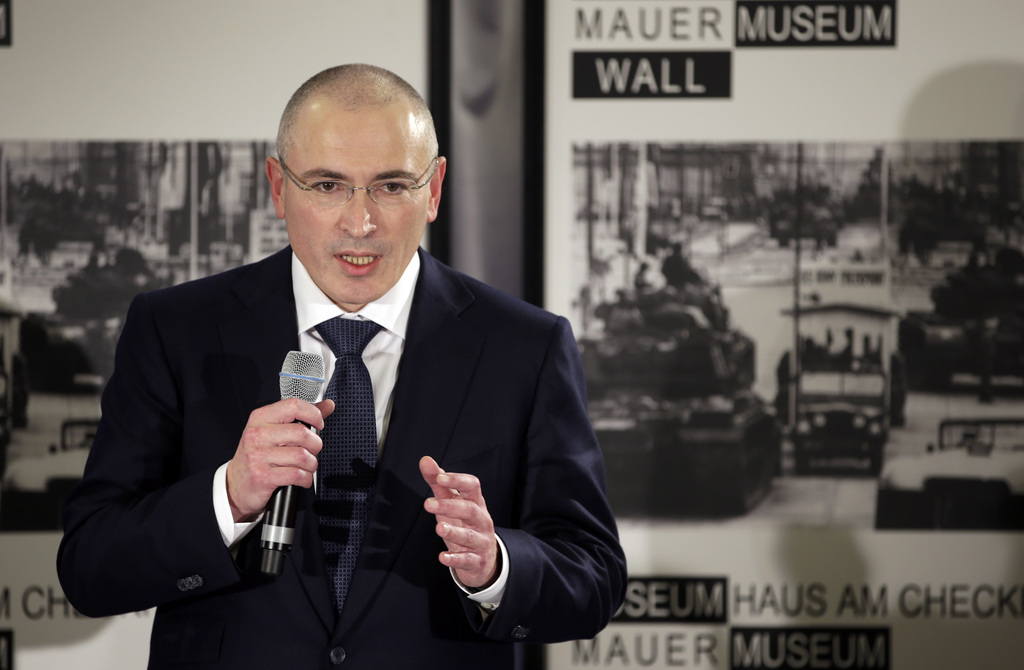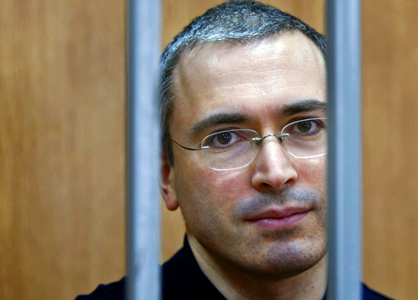Khodorkovsky grateful for Swiss advocacy

The recently released Russian prisoner Mikhail Khodorkovsky said he is “very grateful” to the Swiss for the steps they had taken in recognising and improving his situation. The former oil magnate still has financial and family ties to Switzerland.
Responding to a question from swissinfo.ch, Khodorkovsy said, “I am grateful to Switzerland because it was the first country where the case against (my oil company) Yukos was investigated by legal authorities in detail, and they – at the highest level – reported that it is a political issue. And that Switzerland will not deliver legal assistance to the Russian justice authorities.”

More
Khodorkovsky requests Swiss visa
In 2007, Russian authorities sought to obtain documents from Switzerland on companies and banks linked to Yukos, once the largest oil company in Russia which Khodorkovsky headed up. Khodorkovsky, once the wealthiest man in Russia, was imprisoned in 2003 on charges of fraud and tax evasion.
swissinfo.ch journalist Lioudmila Clot was among a throng of members of the international press who gathered at the Berlin Wall Museum for Khodorkovsky’s first public appearance since his release.
The journalistic jostle for position grew fierce at times, and Clot reports that “it was only with difficulty that a passage could be made between the journalists for Khodorkovsky’s elderly parents.”
And then came Khodorkovsky himself, showing clear signs of where he’d been for the last decade.
“At last a tall, elegant man arrived, wearing a well-tailored suit and expensive aftershave,” Clot observed.
“Pale, carefully shaven, and looking alert, he answered questions without hesitation, and smiled a lot, although he did not hide his bitterness. He twisted a pen between his fingers, and the scars and cuts resulting from the work he had had to do in prison were clearly visible all over his hands.”
The Federal Court ruled not to supply the documents, arguing that according to human rights observers, the Kremlin had opened the case for political reasons to sideline “declared or potential political adversaries”.
As a critic of and political threat to President Vladimir Putin, Khodorkovsky’s charges were considered by the West to be a trumped-up warning from Putin to anyone who might defy him.
In 2010, Khodorkovsky faced a second trial and prison sentence and was not due to be released from prison until August 2014.
Prison visit helped
In his first public appearance before the press since his release, Khodorkovsky also mentioned a visit he had received while in prison from Swiss parliamentarian Andreas Gross, who advocated for his wellbeing.
“He spoke with prison authorities about my situation, the conditions I found myself in,” he said. “And that is exactly the kind of attention that did not allow the people who wanted to worsen my situation to do so.”
In an interview with the German-language Aargauer Zeitung on Monday,
Gross recalled meeting Khodorkovsky in a “bleak and barren” visitors’ room at a suburban Moscow jail in December 2010.
“He made a very modest – almost soft and accessible – impression. But he looked good and healthy. He didn’t pretend he was suffering, but assured us that he was being treated decently,” Gross said, adding that Khodorkovsky looked pretty much the same today.
Asked by the newspaper whether it was appropriate to feel sympathy for a man who had become wealthy at the expense of others after the fall of the Soviet Union, Gross said that it had nothing to do with sympathy – at least regarding Khodorkovsky’s conduct prior to 2000.
“I feel empathy for anyone detained arbitrarily through authoritarian regimes and treated unfairly,” Gross said, noting that like other oligarchs, Khodorkovsky had “stolen” public property by getting it so cheaply.

More
Court rules against Russia over Yukos affair
Net worth, then and now
There has been much speculation about Khodorovsky’s remaining wealth. Russian newspapers estimate that he still has access to about CHF250 million ($280 million), while other sources spoke of something closer to CHF100 million. In 2003, when he went to prison, Forbes magazine estimated Khodorkovsky’s net worth at $15 billion.
In 2004, at the request of Russian authorities, the Swiss federal prosecutor blocked about CHF6.2 billion in funds tied to Khodorovsky’s company being held in Swiss banks. However, the Federal Court later ruled against the move and released most of the funds in June 2004. And in August 2007, the last of the Yukos funds – about CHF200 million – were released, thereby ending the proceedings.
Regarding the freezing of Yukos funds in Swiss bank accounts, Gross said the move was appropriate considering that Khodorkovsky had been a political prisoner – which was why Switzerland had refused to grant Russia access to the funds.
“Switzerland always plays a role if money has been stolen. And that’s what Khodorkovsky did, just like all the other oligarchs in the Yeltsin era,” Gross said. “And it’s probably thanks to Switzerland that Khodorkovsky won’t have any material worries in the future.”
Family ties
Khodorkovsky’s ties to Switzerland aren’t just monetary; his wife and several of his children live in the country.
And one of Khodorkovsky’s last public appearances before his imprisonment took place on August 1, 2003, when he was welcomed by the Swiss Embassy in Moscow to take part in Swiss National Day celebrations. The Swiss ambassador to Russia at the time, Walter Fetscherin, told the Neue Zürcher Zeitung newspaper that he had warned Khodorkovsky that he was in “grave danger” and advised him to leave Russia.
“But apparently he was too proud to do so,” Fetscherin said.
Future plans unclear
Khodorkovsky did not inform the press about his plans for the future. But he did say that he is not interested in pursuing politics or business and will instead focus on his family as well as, perhaps, advocacy projects.
Gross and others have speculated that Khodorkovsky may ultimately choose to reside in Switzerland with his family, but his plans are not currently known.
Khodorkovsky added that his release should not be viewed as a symbol that there are no more political prisoners in Russia.
“The time that is left for me is time I would like to devote to the activity of paying back my debts to the people…and by that I mean the people who are still in prison,” he said.

In compliance with the JTI standards
More: SWI swissinfo.ch certified by the Journalism Trust Initiative








You can find an overview of ongoing debates with our journalists here . Please join us!
If you want to start a conversation about a topic raised in this article or want to report factual errors, email us at english@swissinfo.ch.